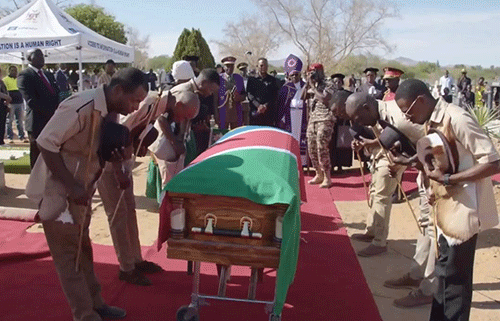Namibians over the weekend bid farewell to the author and composer of the national anthem Axali Jakobus Doëseb, a man who has left an indelible mark on the country’s history and
culture.
Doëseb was laid to rest in a state funeral at the Pioneerspark Cemetery in Windhoek on Saturday, following a memorial service on Friday.
The funeral was attended by high-level dignitaries including vice president Nangolo Mbumba, Prime Minister Saara Kuugongelwa-Amadhila, Chief Justice Peter Shivute, deputy speaker of the National Assembly Loide Kasingo as well as the leader of the official opposition, McHenry Venaani.
Doëseb is survived by his wife Amalia, whom he tied the knot with in 1978. The couple has 10 children. At the memorial service held at the Parliament Gardens, Doëses said her husband was her joy, love and her best friend.
“I saw Axali about 53 years ago, shortly after his move from Okahandja to Katutura in Windhoek. We were both learners at the now Goreangab Primary School. He was friends with my brother, so the chances of us running into each other were great,” recalled Doëses in a tribute read on her behalf.
She added: “Our melody started around 1973 when we became friends forever, love birds later, until we got married on 5 August 1979. The melody in my heart is of blissful years of deepest love, unwavering marriage, genuine partnership that I could never imagine fading in the pain of death.”
President Hage Geingob said in a speech read on his behalf, Doëseb’s calling in life was not to be a battlefield soldier, a diplomat or an adept politician, and that it was the arts, more specifically music.
“He was a master craftsman of lyrics and melodies, who in a few short but poignant verses managed to forge a masterpiece of national harmony, which captured the spirit and psyche of a people who had overcome centuries of colonial oppression to emerge into the dawn of freedom and independence,” reminisced Geingob.
The head of state added that through the national anthem, ‘Namibia, Land of the Brave’, the late composer captured and forever immortalised in the hearts and minds of all Namibians and their generations the revolutionary spirit and bravery.
“For his role as the principal driving force behind the creation of our national anthem, he can never be forgotten, and has etched his name amongst the pantheon of national luminaries whose contributions to the people and country will continue to illuminate the consciousness of the Namibian people for centuries to come,” he said.
Geingob noted that through music, Doëseb managed to encapsulate the spirit of resistance, which was intensifying amongst the masses who had reached the end of their patience with the South African apartheid colonial administration.
He said: “In September 1991, at a formal occasion in Windhoek where he officially handed over the proprietary rights of the national anthem to the Namibian government, and in the process forewent any royalties, the late Comrade Doëseb was asked how he felt about the situation and typically, true to his humble, selfless and patriotic nature, he responded that he was proud to do so, and that national honour for having composed the national anthem meant more for him than money”.
He added that as the country has now embarked on the long and difficult road of the second struggle for the economic emancipation of all Namibian citizens, “let the spirit of this national icon inspire the current cohort of talented Namibians to aspire to greatness, beyond self-aggrandisement, in support of the national interest of unity, peace, stability and shared prosperity for all citizens of the Namibian House”.
Speaking on behalf of the family, Alex Boois said Doeseb was a loving family man, and a prolific hymn writer who was generous in all he did.
“We never truly realised the impact he had on the magnitude of people from walks of life. Since his passing, the family has been overwhelmed and deeply touched by the large outpouring of sympathies, love and care and the interest of Namibians to maintain his legacy,” he added.
The late Doëseb actively and faithfully served Namibia as a prolific composer, musical arranger and performing artist for over 55 years. In 1973, he was the instrumental initiator of the renowned Ugly Creatures. Doëseb was a sports fanatic, and excelled in football and music.
His family at large was talented and loved music. So, he followed and started playing various musical instruments. A German music tutor saw the talent, took him under his care to advance his music, and he soon mastered the piano, brass instruments and guitars.
He then went to Hobschule Herford in Germany, and Middlesbrough University in the UK to study music.
– psiririka@nepc.com.na
Caption (Doeseb)


